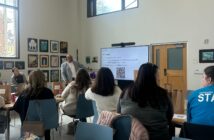
Karen Konkoly
My friend has me cornered in the kitchen.
“If you know the dairy industry treats animals so poorly, why do you still eat dairy?” she asks. She is a vegan.
She has a point. I’ve been coming up with complicated justifications for questions like this one ever since I got to college.
Since then, I’ve tried being a vegetarian, a vegan, an entirely-vegan-except-for-ice-cream, a dairy-free pescetarian and most recently, a plain-old vegetarian again. I am a vegetarian for ethical reasons, but I don’t necessarily think eating dairy and eggs is so ethical either.
The problem for me was being vegan interfered with my social life. My friends knew they couldn’t count on me to join them for all-you-can-eat sushi or Buffalo Wild Wings, and I constantly had to ask for special accommodations as a house guest and when traveling.
When being vegan got too exhausting, I would end up cheating on my veganism every now and then in social situations. Confusion and judgment inevitably followed when I refused to eat dairy-laden lasagna but agreed to go for ice cream afterward.
I stopped labeling myself vegan to prevent my diet from interfering with my life, but I am committed to reducing my consumption of dairy and eggs to a minimal level. It seems to me my experience straddling the line between vegan and vegetarian parallels a situation many Americans are in, straddling the line between vegetarian and omnivore.
Despite the growing body of knowledge that meat consumption is detrimental to our health and to the environment, most people aren’t willing to commit to a permanent lifestyle change by becoming a vegetarian.
Thus, the number of vegetarians has remained fairly constant over the last 70 years. According to Brian Kateman’s upcoming book, “The Reducetarian Solution,” of those that call themselves vegetarians, 60 percent still consume red meat, poultry or fish on occasion, leaving about 2.4 percent committed vegetarians. This percentage has remained fairly constant since 1943. Among those who do commit to labeling themselves as vegan or vegetarian, studies suggest up to 84 percent eventually return to eating meat.
Even if you aren’t opposed to eating animals, the growing body of evidence suggests meat consumption threatens our health and the health of the planet.
One study found that over a six-year period, vegetarians were 12 percent less likely to die of any cause than meat eaters. Further work suggests a plant-based diet can prevent or reverse 15 of the leading causes of death in America. Even diseases we don’t typically associate with diet, like infections, depression and Parkinson’s disease can all be countered by eating more whole plant foods and less meat.
The meat and dairy industry also poses devastating consequences for the environment and for the animals implicated in them. Some 14.5 percent of all human-generated greenhouse gasses come from raising livestock, the same contribution as emissions from all forms of transportation combined.
Plus, factory farms often raise animals in horrendous conditions. Even organic, cage-free eggs are produced by hens that spend their entire lives in an unsanitary, overcrowded barn and sometimes die prematurely after being eaten alive or smothered by their confused, stressed-out peers.
Are you plugging your ears? Maybe your absolute favorite breakfast is sunny-side up eggs. It’s tempting to push these unpleasant realities to the back of our minds, or to come up with elaborate rationalizations explaining why we are entitled to our steak, eggs or milk.
Unplug them. The fact remains that consuming animal products results in a slew of health, environmental and ethical issues. The tiny minority of Americans committed to being vegetarians or vegans can only make a limited impact. Yet, how many of us are willing to commit to such a label and look forward to a future without bacon or fish tacos?
Few of us will become vegetarian — and fewer still vegan — but the growing “reducetarianism” movement is something we can all get behind.
Being a reducetarian is simple: eat less meat. Accept the fact that buying into the meat industry causes problems, and then continue life as normal. You don’t even have to announce what you’re doing. Just skip the pepperoni. Get veggies instead of chicken in your stir-fry rice. If you had meat for lunch, have a plant-based dinner. Cook with vegetable broth instead of chicken or beef. Try the Chipotle sofritas!
Regardless of degree or motivation, becoming a reducetarian will benefit you and the world around you. The movement eliminates the stink of moral superiority — uniting vegans, vegetarians and all people aiming to reduce their consumption of animal products.
Tell your friends. You don’t need to make radical life changes to cause radical world changes.
—
Karen Konkoly, ’17, is a columnist for The Brown and White. She can be reached at krk217@lehigh.edu





Comment policy
Comments posted to The Brown and White website are reviewed by a moderator before being approved. Incendiary speech or harassing language, including comments targeted at individuals, may be deemed unacceptable and not published. Spam and other soliciting will also be declined.
The Brown and White also reserves the right to not publish entirely anonymous comments.
2 Comments
Please read Eat Right for Your Type, a book by Dr, Peter J. D’Adamo which gives rational explanations as to why one should tend to be a vegetarian or not based upon blood type. It seems that a blood type determines a spectrum of eating choices rather than one specific part of a spectrum. The spectrum seems to different for those of a particular blood type.
Among many other things, the book explains why many westerners (type O) and many orientals (type A) have a similar problem with beans and red meat respectively.
Pingback: Cura Personalis: The thing about food labels - The Brown and White